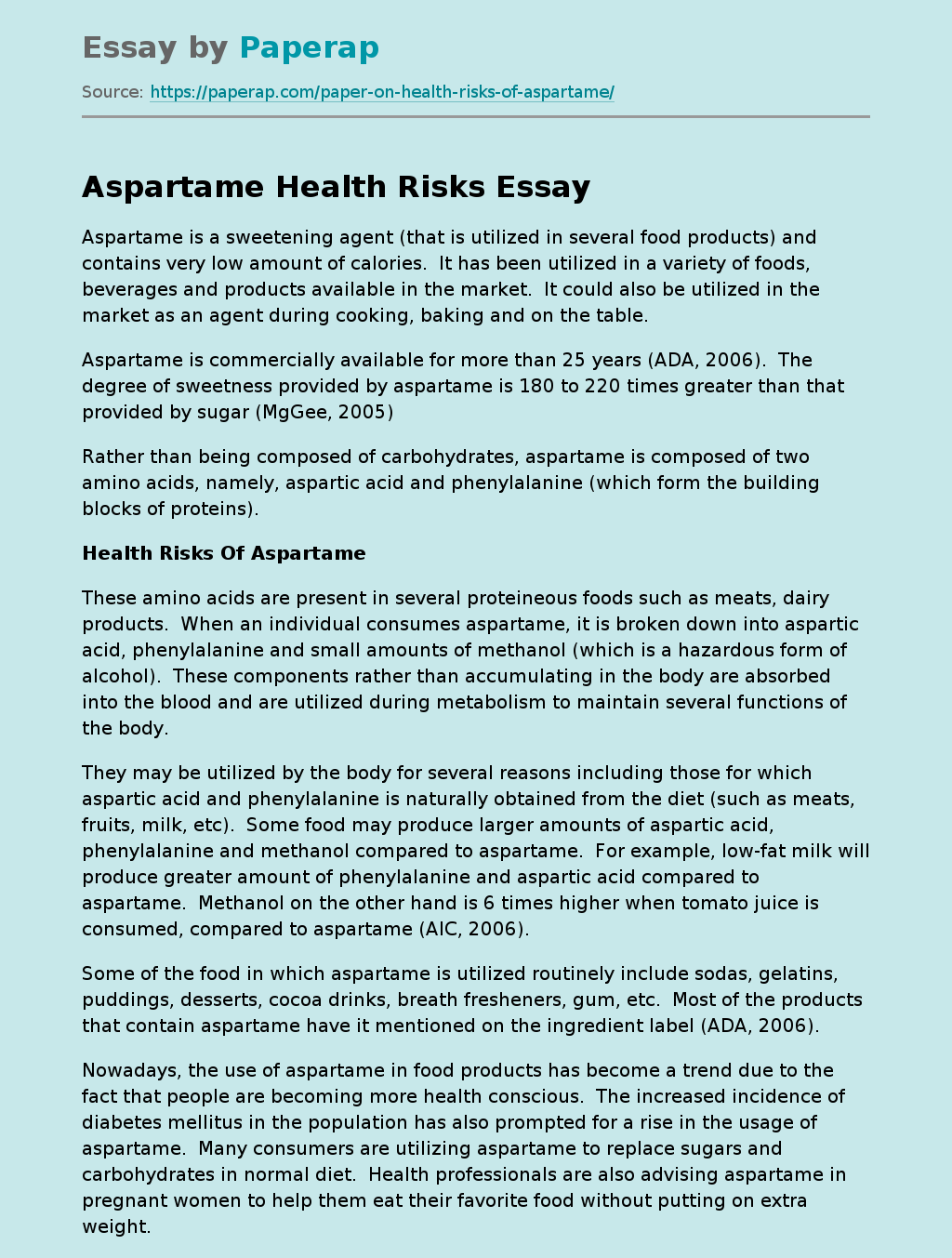Health Risks From Aspartame
Aspartame is a sweetening agent (that is utilized in several food products) and contains very low amount of calories. It has been utilized in a variety of foods, beverages and products available in the market. It could also be utilized in the market as an agent during cooking, baking and on the table.
Aspartame is commercially available for more than 25 years (ADA, 2006). The degree of sweetness provided by aspartame is 180 to 220 times greater than that provided by sugar (MgGee, 2005)
Rather than being composed of carbohydrates, aspartame is composed of two amino acids, namely, aspartic acid and phenylalanine (which form the building blocks of proteins).
These amino acids are present in several proteineous foods such as meats, dairy products. When an individual consumes aspartame, it is broken down into aspartic acid, phenylalanine and small amounts of methanol (which is a hazardous form of alcohol). These components rather than accumulating in the body are absorbed into the blood and are utilized during metabolism to maintain several functions of the body.
They may be utilized by the body for several reasons including those for which aspartic acid and phenylalanine is naturally obtained from the diet (such as meats, fruits, milk, etc). Some food may produce larger amounts of aspartic acid, phenylalanine and methanol compared to aspartame. For example, low-fat milk will produce greater amount of phenylalanine and aspartic acid compared to aspartame. Methanol on the other hand is 6 times higher when tomato juice is consumed, compared to aspartame (AIC, 2006).
Some of the food in which aspartame is utilized routinely include sodas, gelatins, puddings, desserts, cocoa drinks, breath fresheners, gum, etc.
Most of the products that contain aspartame have it mentioned on the ingredient label (ADA, 2006).
Nowadays, the use of aspartame in food products has become a trend due to the fact that people are becoming more health conscious. The increased incidence of diabetes mellitus in the population has also prompted for a rise in the usage of aspartame. Many consumers are utilizing aspartame to replace sugars and carbohydrates in normal diet. Health professionals are also advising aspartame in pregnant women to help them eat their favorite food without putting on extra weight.
However, this may not be right, because babies present in the womb require the right quantity of calories and other nutrients for proper growth and development. Even during breastfeeding, the nursing mother should ensure that she receives the exact amount of calories and other nutrients by consuming natural sweeteners, rather than the artificial ones (ADA, 2006).
Some people may have a rare genetic disorder known as ‘phenylketonuria’ in which they are unable to breakdown and utilize phenylalanine present in the diet. Such individuals may have to modify the diet by consuming lower amounts of products containing phenylalanine. Such individuals should also avoid aspartame, as it may be injurious to their health (ADA, 2006).
These individuals do not have an enzyme that transform phenylalanine into tyrosine. Hence, in such individuals, the levels of phenylalanine would accumulate in the CNS, causing a variety of neurological and psychiatric symptoms.
Usually, the parents of phenylketonurics are carriers of the disease (may not actually suffer from the disease, but can genetically carry the defective gene which could express the disease in their offsprings). The number of carriers of phyenylketouric is about 4 to 20 million. These individuals are also at a high risk of suffering from the toxic effects of the sweetener (Schachter, 1996).
Recent and earlier studies have demonstrated that aspartame may be very harmful to certain patients as they may induce seizures. Studies that had been performed in 1987 have demonstrated that certain individuals after consuming aspartame developed seizures (especially the grand-mal type). The seizures tend to reduce once the individual stopped consumption of the sweetening agents. However, only some individuals may be at a risk of developing seizures following aspartame consumption.
Another incident regarding aspartame occurred when a nursing mother who consumed an aspartame containing gum, had her baby develop grand mal seizures (Veracity, 2005). Researchers feel that a link between aspartame and the development of seizures has been identified. Once aspartame is consumed by the body, it is broken down into phenylalanine and aspartic acid.
These amino acids would then cross the blood-brain barrier and would directly affects the functioning of the CNS (Brain). Although, phenylalanine is present in a natural diet, it may not be present in combination with aspartic acid. Researchers feel that the combination of both these amino acids can potentially cause a lot of health hazards. The exact mechanism of how the component/s of aspartame induce seizures is not identified.
Some scientists feel that phenylalanine works by reducing the threshold for convulsions to develop, whereas others feel that the combination of phenylalanine and aspartic acid works by inducing seizures (Veracity, 2005). Many people feel that aspartame works like a neurotoxin in the brain, by over-stimulating the cells present in the brain (Veracity, 2005). In naturally occurring foods, phenylalanine and aspartic acid are present as amino acids in long-chains, associated with other amino acids.
These chains may take long time to be broken down by the body and be utilized for several metabolic processes. Hence, they do not readily enter the CNS (compared to when aspartame is consumed). They may take longer than 12 hours to be digested (321 Recipes, 1996).
Health Risks From Aspartame. (2019, Dec 05). Retrieved from https://paperap.com/paper-on-health-risks-of-aspartame/

